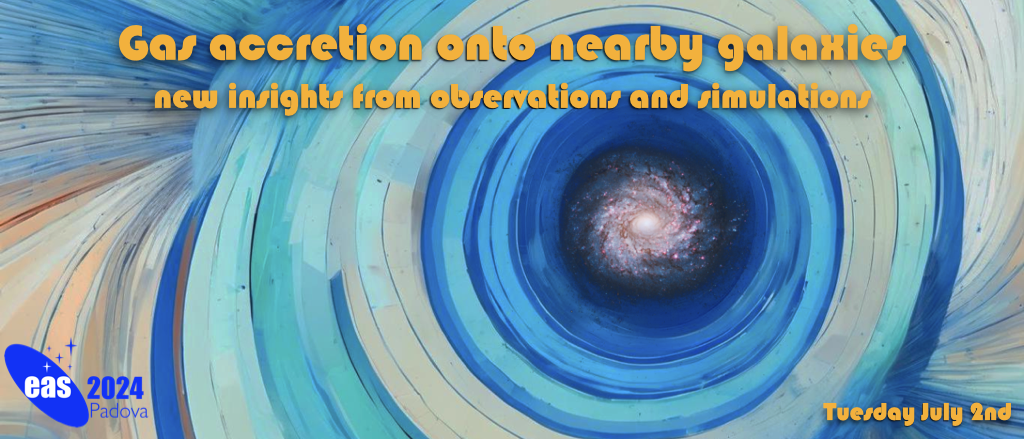Special Session SS11
2 July 2024
Gas accretion onto galaxies: new insights from observations and simulations

Aims and scope
At all redshift, star-forming galaxies require a continuous supply of cold gas to replenish the material used for their star formation processes. However, in the local Universe, where the most sensitive data are available, observational evidences for extragalactic gas accretion onto galaxies have been consistently scarce, systematically suggesting that only a small fraction of the required fuel originates from direct infall of cold gas clouds or wet mergers.
At the same time, in spite the availability of highly refined numerical models of galaxy evolution, there have been a limited effort by the theoretical community in characterising the exact modes by which circumgalatic gas is transferred onto galaxies, its detailed properties (temperature, column density, ionisation state, angular momentum), and the observational signatures of such accretion processes.
These limitations are also driven by a somewhat one-sided approach to the study of gas cycle around galaxies, where the primary focus is the characterisation of gaseous outflows driven by stellar and AGN feedback.
It is clear that further progress demands a stronger synergy between the observational and the theoretical communities. This special session aims at bringing the two communities together in the attempt of building the synergy required to pave the way to future developments in the field.
Programme
The main questions addressed during the meeting will be:
- What did we learn about neutral gas accretion from the latest, deepest HI surveys of nearby galaxies (e.g. MHONGOOSE, HALOGAS)?
- What did we learn about ionised gas accretion from the latest optical IFS data (e.g. MUSE, WEAVE) or UV absorption-line studies?
- What are the main properties (temperature, column density, ionisation state, angular momentum) of the accreting gas in hydrodynamical models, and how do these properties depend on the details of the model itself (e.g. hydro code, resolution, feedback recipes)?
- What can we learn from synthetic observations of simulated galaxies, and what are their main advantages and limitations?
Invited speakers
- Filippo Fraternali (Kapteyn Institute, Groningen, NL)
- Federico Marinacci (University of Bologna, IT)
Scientific organisers
- Antonino Marasco (chair) (INAF-Padova Observatory, IT)
- Erwin de Blok (ASTRON, Dwingeloo, NL)
- Philipp Richter (University of Potsdam, DE)
- Joop Schaye (Leiden Observatory, NL)
Contact
antonino.marasco @ inaf.it
Updated on Wed Jan 17 17:30:23 CET 2024
|